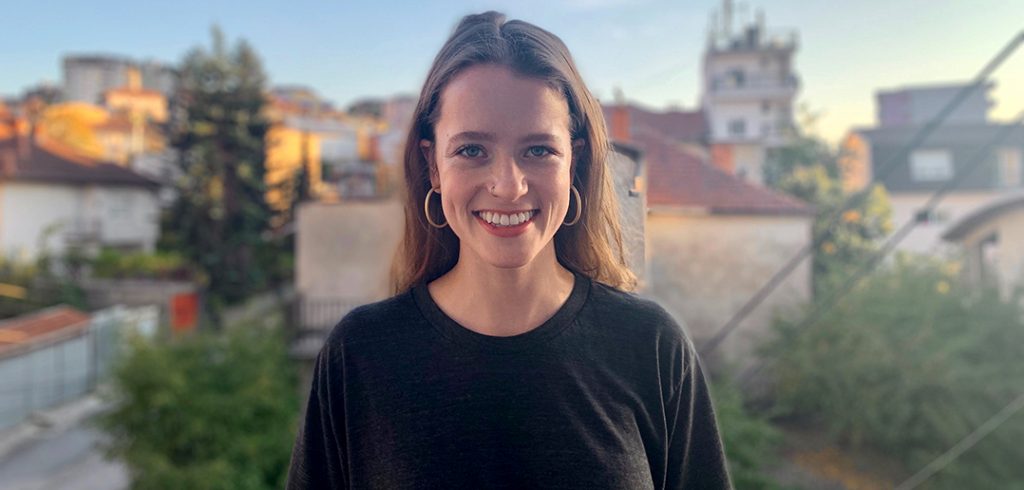In her first few weeks there, she said she found an apartment and settled into a “gritty” neighborhood not far from the university, where concerts and festivals are frequent. Her favorite local food is burek, flaky pastry sheets filled with spinach, cheese, and/or meat, and her favorite local drink is rakia, a Balkan moonshine that’s akin to a strong fruit-flavored brandy. But above all, she said, she likes the people. She was there during college and has wanted to return ever since.
“It’s been good to see some friends after meeting them here four years ago,” she said. “Being able to get settled helps me feel more like a local and since I’ll be here nine months I should be able to understand the nuances a bit better.”
The Journey Before the Journey
Winsett said that being awarded the Fulbright began with an email about an info session sent out by the Office of Prestigious Fellowships in 2018.
“It seemed like a great opportunity,” she said. “I don’t think at the time I realized it would take over a year to finish the application.”
She credited, Anna Beskin, Ph.D., international fellowship coordinator, with guiding her through the arduous process. She said that Beskin gave her nearly “100 comments per draft” on her essays, and there were at least a dozen drafts of two separate essays.
“Anna is a major reason I was even awarded the grant,” said Winsett.
Winsett had studied journalism abroad in Kosovo when she went to Miami University in Ohio in 2015. She noted that it’s one of the world’s newest nations. With more than half its population under 25, she made lots of friends her own age. The majority of the ethnic Albanian nation did not become unified until it broke from Serbia in 2008, in the wake of the Yugoslavian civil war, though Serbians refuse to recognize its independent status.
On that trip, Winsett worked with a nonprofit that helped other nonprofits interface with the government. Back in Ohio, she advocated for sexual abuse survivors at a rape crisis center in a rural county. She would respond directly to hospital calls, help victims get rape kits, give testimonies, and talk to the police. Together these two experiences led her toward the Graduate School of Social Service (GSS) at Fordham. At GSS she was on the leadership and administration track, which combined the micro and macro practices, which dovetailed well with her experience.
Bringing an American Brand of Awareness
In addition to her classroom duties, Winsett will also need to fulfill a community engagement requirement.
So far, she’s reached out to three organizations that work with sexual abuse survivors and plans to meet with a social worker to discuss how she can navigate the volunteer culture there. But coming from the fast pace of New York City, where people answer emails within the hour, to an area where response time is a bit slower has proved to be her first real cultural adjustment.
“I’ve been really trying to manage my own expectations for the replies and meetings,” she said. “European time can be a bit more fluid.”
While she waits to connect the dots, she said she’s enjoying teaching her students at the university and helping them fill out applications for American colleges. She said she often gets together with four other Fulbright grantees for dinner to compare notes.
She noted that Kosovo is only now starting to recognize wartime sexual violence that occurred more than 20 years ago, when Yugoslav and Serbian forces systematically used rape as a wartime method to terrorize ethnic Albanians.
But even in times of peace, she said, rape and sexual violence are still rampant all over the world.
“I think you can say that there’s an epidemic of sexual violence on college campuses in the U.S. right now, so I think it’s still highly prevalent everywhere,” she said.
“No matter where it’s happening, I think it is still underreported, so we’re hearing all these different cases of men, women, transgender people—trans people of color are highly vulnerable,” she said. “Everyone is affected and we act as though it’s only men perpetrating violence against women, but really, it’s across the board.”
Winsett said that while there are many issues to address, her main goal is to strike a friendly tone about a nation that she has grown increasingly fond of.
“I want to dive deeper and actually visit more of the cities within Kosovo,” she said. “Kosovo’s interesting in that they’re so pro-U.S., that they might even be more pro-U.S. than some American citizens.”
She said that people still remember NATO’s role in stopping the bombings of the region by Serbia.
“Streets are named after Clinton and Tony Blair,” she said. “I’m excited to be in that region because I think it’s not a typical tourist destination, and I’m also excited to visit Bosnia.”
She said that beyond volunteer work she hopes to create awareness about sexual violence in a variety of platforms.
“I think that since the population is so young, they’re social media savvy so they’re already familiar with #MeToo,” she said. “I think this sort of work takes education and awareness, so that’s another way to approach the issue.”
But ultimately, she said, she’s looking forward to learning.
“It’s about admitting that you don’t know everything, that you’re going to make some mistakes,” she said, “and you need to be open to having these conversations.”


